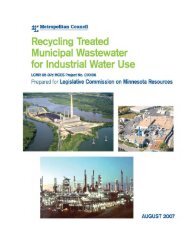Chapter One Federal Government - Minnesota State Legislature
Chapter One Federal Government - Minnesota State Legislature
Chapter One Federal Government - Minnesota State Legislature
You also want an ePaper? Increase the reach of your titles
YUMPU automatically turns print PDFs into web optimized ePapers that Google loves.
Legacy <strong>Chapter</strong> Seven<br />
Sec. 12. Imprisonment for debt; property exemption. No person shall be imprisoned for debt in this state, but<br />
this shall not prevent the legislature from providing for imprisonment, or holding to bail, persons charged with fraud<br />
in contracting said debt. A reasonable amount of property shall be exempt from seizure or sale for the payment of<br />
any debt or liability. The amount of such exemption shall be determined by law. Provided, however, that all property<br />
so exempted shall be liable to seizure and sale for any debts incurred to any person for work done or materials furnished<br />
in the construction, repair or improvement of the same, and provided further, that such liability to seizure and<br />
sale shall also extend to all real property for any debt to any laborer or servant for labor or service performed.<br />
Sec. 13. Private property for public use. Private property shall not be taken, destroyed or damaged for public use<br />
without just compensation therefor, first paid or secured.<br />
Sec. 14. Military power subordinate. The military shall be subordinate to the civil power and no standing army<br />
shall be maintained in this state in times of peace.<br />
Sec. 15. Lands allodial; void agricultural leases. All lands within the state are allodial and feudal tenures of every<br />
description with all their incidents are prohibited. Leases and grants of agricultural lands for a longer period than 21<br />
years reserving rent or service of any kind shall be void.<br />
Sec. 16. Freedom of conscience; no preference to be given to any religious establishment or mode of worship.<br />
The enumeration of rights in this constitution shall not deny or impair others retained by and inherent in the people.<br />
The right of every man to worship God according to the dictates of his own conscience shall never be infringed; nor<br />
shall any man be compelled to attend, erect or support any place of worship, or to maintain any religious or ecclesiastical<br />
ministry, against his consent; nor shall any control of or interference with the rights of conscience be permitted,<br />
or any preference be given by law to any religious establishment or mode of worship; but the liberty of conscience<br />
hereby secured shall not be so construed as to excuse acts of licentiousness or justify practices inconsistent<br />
with the peace or safety of the state, nor shall any money be drawn from the treasury for the benefit of any religious<br />
societies or religious or theological seminaries.<br />
Sec. 17. Religious tests and property qualifications prohibited. No religious test or amount of property shall be<br />
required as a qualification for any office of public trust in the state. No religious test or amount of property shall be<br />
required as a qualification of any voter at any election in this state; nor shall any person be rendered incompetent to<br />
give evidence in any court of law or equity in consequence of his opinion upon the subject of religion.<br />
ARTICLE II<br />
NAME AND BOUNDARIES<br />
Section 1. Name and boundaries; acceptance of organic act. This state shall be called the state of <strong>Minnesota</strong> and<br />
shall consist of and have jurisdiction over the territory embraced in the act of Congress entitled, “An act to authorize<br />
the people of the Territory of <strong>Minnesota</strong> to form a constitution and state government, preparatory to their admission<br />
into the Union on equal footing with the original states,” and the propositions contained in that act are hereby<br />
accepted, ratified and confirmed, and remain irrevocable without the consent of the United <strong>State</strong>s.<br />
Sec. 2. Jurisdiction on boundary waters. The state of <strong>Minnesota</strong> has concurrent jurisdiction on the Mississippi<br />
and on all other rivers and waters forming a common boundary with any other state or states. Navigable waters<br />
leading into the same, shall be common highways and forever free to<br />
citizens of the United <strong>State</strong>s without any tax, duty, impost or toll therefor.<br />
ARTICLE III<br />
DISTRIBUTION OF THE POWERS OF GOVERNMENT<br />
Section 1. Division of powers. The powers of government shall be divided into three distinct departments: legislative,<br />
executive and judicial. No person or persons belonging to or constituting one of these departments shall exercise<br />
any of the powers properly belonging to either of the others except in the instances expressly provided in this<br />
constitution.<br />
ARTICLE IV<br />
LEGISLATIVE DEPARTMENT<br />
Section 1. Composition of legislature. The legislature consists of the senate and house of<br />
representatives.<br />
Sec. 2. Apportionment of members. The number of members who compose the senate and house of representatives<br />
shall be prescribed by law. The representation in both houses shall be apportioned equally throughout the different<br />
sections of the state in proportion to the population thereof.<br />
245<br />
<strong>Chapter</strong><br />
Seven<br />
Legacy
















